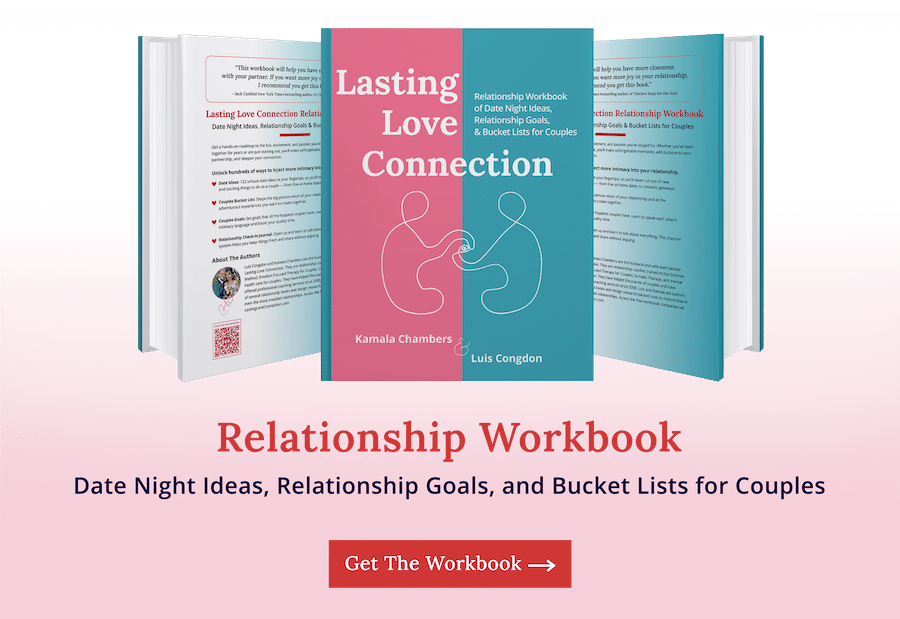With the Four Horsemen, Gottman can predict with 96% certainty which couples will stay together and which will break up.
Would you like to know what the Four Horsemen are so you can have a healthier relationship?
Recognizing destructive behaviors in a relationship is the first step.
From there, you can replace toxic behaviors with healthy habits that ensure long-lasting love.
Let’s explore the four horsemen and the suggestions for countering them with positive actions to create a stronger relationship.
Table of Contents
What are the 4 horsemen of the apocalypse, according to Gottman’s research?

Dr. John Gottman, an esteemed psychologist and marriage counselor, dedicated years to studying couples in his Love Lab.
By closely observing their interactions, he identified behaviors that contribute to successful relationships and others that lead to their downfall.
With the four horsemen Gottman discovered four negative communication styles that predict relationship failure
In the Bible’s New Testament, four horsemen signify the end of the world. To be clear, the Four Horsemen are not tied to religion.
Dr. John Gottman adapted this idea and identified four behaviors that foreshadow the end of a relationship or signs of impending divorce.
Again, note that the Four Horsemen are not religious in nature.
John Gottman’s four horsemen of the apocalypse are criticism, contempt, defensiveness, and stonewalling.
When these communication habits are present during a conflict, it increases emotional distance and disconnection in a relationship.
Let’s take a look at these four behaviors so you can better spot them and stop these toxic patterns.
Criticism

The first horseman is criticism.
When you criticize your partner, you attack their character.
For example, say your partner forgets to pick up the groceries you requested.
You say, “You never do what I ask you to! You’re so unreliable and inconsiderate.”
The conversation shifts from the groceries to your partner’s personality flaws.
If you use words like “always” or “never” to describe your partner’s behavior, it’s likely criticism.
However, it’s crucial to note that expressing a complaint differs from giving criticism.
In the same scenario, expressing a complaint would look like, “I was feeling overwhelmed by all of the chores on my plate and was hoping you could support me with this task.”
When you make a complaint, you focus on the issue at hand rather than making it about who your partner is as a person.
Criticism is dangerous as it often leads to other horsemen, such as contempt.
Contempt

While criticism is damaging, contempt takes it to a new level.
It involves not only attacking your partner’s character but also assuming superiority over them.
Contempt can take many forms, such as sarcasm, mockery, name-calling, or eye-rolling.
Contempt is basically implying that you believe you are better than your partner through hurtful remarks and negative body language.
If your wife or husband makes you feel worthless, it could be a sign of contempt.
Defensiveness

The third horseman is defensiveness.
The Gottman Institute defines defensiveness as a form of self-protection that involves righteous indignation or innocent victimhood to ward off a perceived attack.
Defensiveness is a common response when a person feels threatened.
When feeling attacked, a person may start making excuses for their behavior or assume the role of the innocent victim.
For instance, if your partner mentions that you didn’t call them after work like usual, a defensive response would be, “You know how stressed I’ve been. It’s not like you never call me.”
However, defensive listening dismisses your partner’s complaint and avoids taking responsibility for your actions.
Deflecting responsibility can make your partner feel unheard or invalidated.
Ultimately, when you or your partner becomes defensive, it only tends to escalate the conflict.
Stonewalling

When one partner shuts down and disengages from a discussion during conflict, it is known as stonewalling.
When a person stonewalls, they may withdraw by tuning out, turning away, or staying silent.
Stonewalling happens due to emotional flooding or overwhelm.
During conflict, your brain detects a threat and releases stress hormones into your body resulting in symptoms like a rapid heart rate, sweating, and muscle tension.
You go into what is known as fight, flight, freeze, or fawn.
In this state of self-protection, you lose the ability to think rationally and problem-solve.
When you are outside your window of tolerance, engaging in a productive conversation becomes impossible.
Stonewalling indicates that you need to take a break before you can re-engage in the conversation.
Which of the four horsemen of the apocalypse is most detrimental to relationships?

Gottman’s research has revealed that contempt is the most destructive behavior in relationships.
Also, contempt is the number one predictor of divorce.
Contempt is particularly dangerous because it attacks your partner’s sense of self.
When you belittle your partner, you damage trust and emotional safety in your relationship.
Additionally, contempt has adverse effects on both emotional and physical health.
Research by the Gottman Institute found that couples who show contempt towards each other are more likely to have weakened immune systems and get sick more often.
How to stop the four horsemen Gottman method with their antidotes?
Identifying the four horsemen during conflict conversations is the first step toward eliminating them.
Then, you can replace these negative behaviors with more constructive & effective communication habits.
All the horsemen have a corresponding antidote, a new behavior you can adopt to counter the negative one.
Instead of criticism, use a gentle startup

Criticism often arises when there is an unmet need.
However, approaching your partner with criticism reduces the likelihood of getting your needs met.
Dr. John Gottman discovered he could predict whether a conversation would lead to escalated conflict or resolution within the first few minutes of the couple talking.
Starting with criticism led to more arguing while approaching the conversation calmly paved the way for constructive problem-solving.
The finding is clear: how you begin a conversation about a problem is crucial.
To counteract criticism, try using a gentle startup.
During a gentle startup, use “I” statements to focus on your own feelings and needs instead of blaming the other person.
For example, you might say, “I feel hurt when I come home, and you continue reading your book without acknowledging me. Can we take a few minutes to reconnect and share about our day before doing our separate things?”
This statement would likely elicit a much different response than criticism like, “You always ignore me. It’s like you don’t even care whether I’m here.”
By calmly expressing your unmet needs, you can discuss the issue without causing your partner to feel attacked.
Instead of contempt, focus on appreciation

Sometimes, contempt arises when you hold onto resentment towards your partner for a long time.
To overcome resentment, try expressing your feelings and needs without blaming your partner.
Try using ‘I statements’ such as ‘I feel hurt when…’ or ‘I feel frustrated when…’.
Another effective way to counteract contempt is building a culture of appreciation in your relationship.
When you have built-up resentment, it distorts your perception of your partner, and all you see are how they fall short or fail to meet your needs.
It’s easy to overlook everything your partner does right in your relationship.
You can cultivate appreciation by focusing on your partner’s positive qualities.
For example, if your partner did the dishes without being asked, acknowledge their efforts and thank them.
Focusing on what is going well rather than what is missing amplifies positive feelings in your relationship.
Instead of defensiveness, take responsibility

If your partner has a complaint, take a moment to collect your thoughts before responding.
To counteract defensiveness, take responsibility for your part in the situation.
Listen to your partner’s concerns and try to understand their perspective.
For example, you could say, “I understand what you’re saying, and I’m sorry for not communicating clearly.”
When you accept responsibility for your actions, you demonstrate that you value your partner’s feelings and concerns.
Instead of stonewalling, practice self-soothing and taking breaks

During a disagreement or conflict, it’s possible to become emotionally overwhelmed (also known as emotional flooding).
Signs of emotional flooding include
- Rapid heart rate
- Shallow breathing
- Increased body temperature
- Muscle tension
- Stomach discomfort
- Trouble focusing
- Negative self-talk
- Intense feelings of anxiety or anger
- Desire to escape the situation
When emotional flooding is present, you and your partner can’t have a productive conflict discussion.
To counteract stonewalling, Gottman recommends taking a 20-minute break for self-soothing.
This break allows the stonewalling person to self-soothe by walking, practicing deep breathing or meditation, or engaging in another soothing activity like reading.
It’s important to note that the flooded person should avoid dwelling on the conflict.
Once you and your partner feel calm, you can re-engage in conflict resolution from a grounded state.
You can break the power of the four horsemen Gottman method

Gottman’s research uncovered a crucial factor distinguishing happy couples from unhappy ones: the ratio between positive and negative interactions.
He discovered that it takes five positive interactions to counteract the effects of a single negative one.
This finding implies that in a healthy relationship, there is enough positivity and connection to outweigh moments of criticism or defensiveness when they do occur.
Conversely, couples who lack positive interactions to counterbalance negative ones are at a greater risk of divorce.
Increase the ratio of positive to negative interactions
Even in healthy relationships, conflicts may lead to the emergence of the four horsemen.
However, incorporating more positive patterns can act as a buffer when communication becomes challenging.
Incorporate healthy behaviors during conflict discussions, such as:
- Showing interest in what your partner is sharing.
- Maintaining eye contact and open body language.
- Asking open-ended questions.
- Accepting your partner’s perspective.
- Validating your partner’s feelings.
- Taking responsibility for your actions and apologizing when necessary.
Additionally, consider how you can build positive patterns in your relationship outside of conflict.
For example, you might start by:
- Spending meaningful time together on date nights.
- Expressing appreciation and gratitude.
- Showing affection through physical touch (like hand-holding, hugging, or rubbing your partner’s shoulders.)
- Scheduling regular relationship check-ins.
For a hands-on guide to relationship check-ins and 100+ unique date ideas, pick up the Lasting Love Connection Workbook.

Seek professional support
If you and your partner are struggling with harmful communication patterns, seek support from a trained professional.
A marriage and family therapist or relationship coach will guide you in resolving conflicts and improving your communication skills.
With the right support, you can break recurring patterns and move toward a healthy relationship.
Book a complimentary consultation to see if working with us would be a good fit.






0 Comments